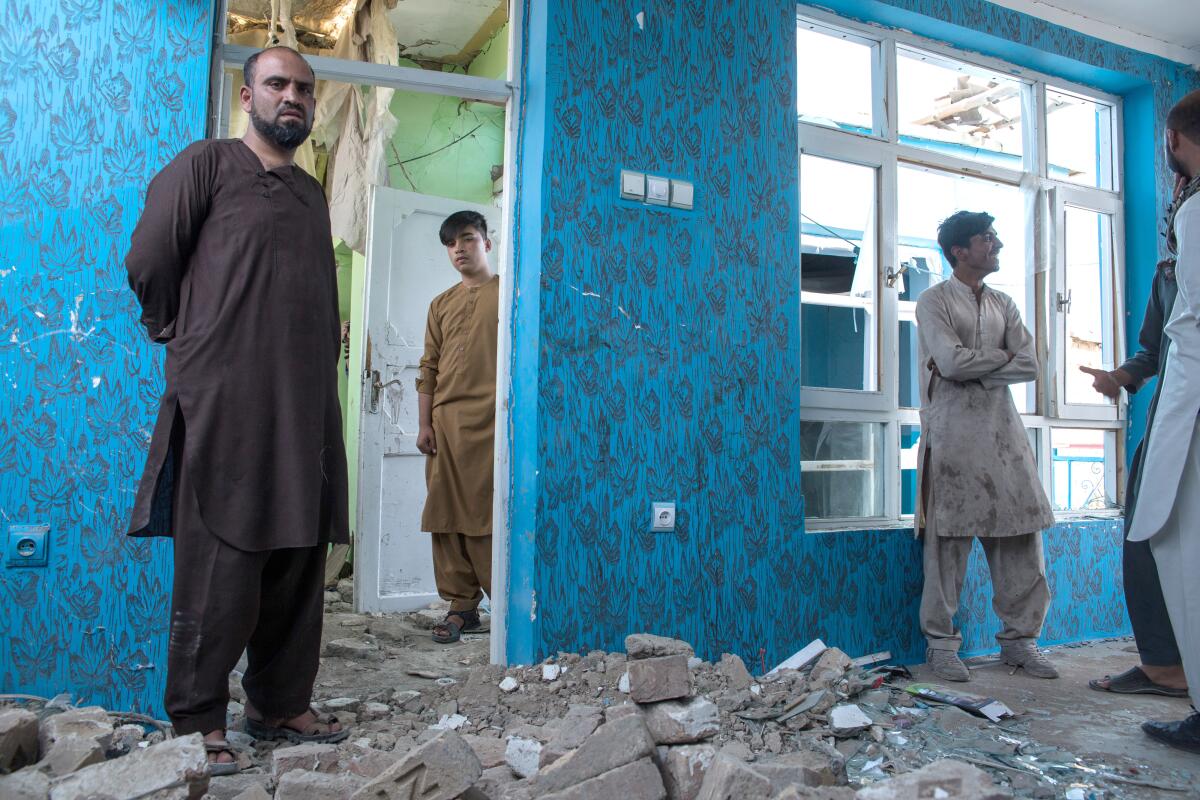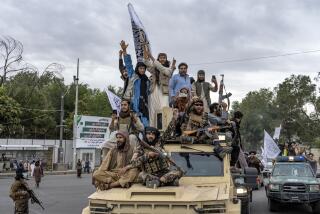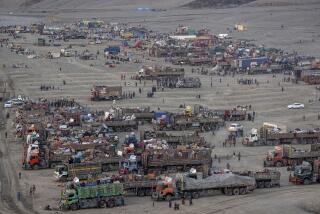As election approaches, Afghans complain their country is run by the diaspora

Sakhi Murad Sadar stood in the ruins of his family’s house, where rubble covered the living room floor and the blue wallpaper was spattered with blood. In the aftermath of a Taliban car bombing, he said he would sit out Afghanistan’s upcoming presidential election.
“It’s too dangerous to vote,” explained the father of two, whose house was damaged in the bombing this month that killed 16 people and injured more than 100. The candidates in Saturday’s election and other senior officials are insulated from Afghanistan’s worsening violence because their families live abroad, he added.
“Who can I trust to lead my country if most of the candidates’ families are not even in Afghanistan anyway?” said Sadar, 28. “If the situation gets worse, we are still here. They won’t get killed, but we might.”
Sadar’s frustrations are shared by an increasing number of Afghans. President Ashraf Ghani’s children were born and raised in the U.S., while Ghani’s Lebanese American wife frequently travels outside Afghanistan. Challenger Abdullah Abdullah’s wife and children live in India.
Many government ministers hold dual citizenship and have close relatives living outside Afghanistan. They are part of an Afghan elite that is perceived by many to have sought refuge and invested money in foreign countries over the last four decades of civil war, extremist Taliban rule and foreign occupation.
Many Afghans see them as disconnected from their struggles.
“I can’t trust people who didn’t feel what I felt over the years when attacks happened throughout the city, wondering if my child, my wife or my brother were still alive,” said Zaki Daryabi, editor in chief of Kabul-based newspaper Etilaat Roz. “Their families are overseas, they live in heavily fortified houses and drive armored vehicles.
“They aren’t walking the streets of Kabul, and they will never share our fear.”
Ghani, a former U.S. citizen, says he gave up his American passport “a long time ago.” He would otherwise be ineligible to run for president.
A spokesman for Afghanistan’s election commission, Abdul Aziz Ibrahimi, said candidates’ families had the right to live wherever they want and described the main presidential contenders as experienced politicians.
“While it’s a problem that most of the candidates’ families live abroad, they aren’t required to be here,” Ibrahimi said.
Resentment of Afghanistan’s ruling class has deepened as attacks on civilians continue. The United Nations counted nearly 4,000 deaths and injuries among civilians in the first six months of 2019.
That’s 27% fewer than the same period in 2018. But in recent weeks, Taliban militants have carried out numerous high-profile attacks as they attempt to strengthen their bargaining position in negotiations with the U.S. to end 18 years of hostilities.
President Trump called off talks this month, citing the Taliban’s continued attacks, but the administration remains eager to reach a deal that would allow Trump to withdraw U.S. troops from Afghanistan during his 2020 reelection campaign.
At the same time, U.S. and Afghan forces are blamed for a growing number of civilian casualties and were responsible for more civilian deaths than militant groups in the first half of the year, according to U.N. figures. Most of the deaths attributed to U.S. forces have occurred in airstrikes.
Last week, a U.S. strike targeting an Islamic State hideout in the eastern province of Nangarhar reportedly killed 30 pine nut farmers by mistake.
The election, already postponed twice, had been in doubt just weeks ago when there were reports of an imminent U.S.-Taliban deal that could have prompted the formation of an interim government. Ghani, whose government has been excluded from the talks, has pushed for the election to take place.
The Taliban has long opposed the election and warned voters to “stay away from gatherings and rallies that could become potential targets.”
Much of the campaigning has been done virtually, with presidential candidates addressing rallies via video conference.
This month, during a rally attended by Ghani in Parwan, a province neighboring Kabul, a suicide bomber on a motorcycle detonated explosives, killing 30 people.
In parliamentary elections last year, almost two-thirds of voters stayed away from the polls.
“We have reason to believe that this year’s turnout could be even lower,” said Ali Yawar Adili, an election expert at the Afghanistan Analysts Network, a Kabul-based research group. “People have lost confidence.”
The list of foreign-passport holders in Ghani’s Cabinet is long. The acting finance minister, Mohammad Humayon Qayoumi, and industry minister, Ajmal Ahmadi, are naturalized U.S. citizens. Ghani’s national security advisor Hamdullah Mohib is a British national. Top presidential advisor Fazel Fazly holds a Swedish passport.
Abdullah’s spokesman Mujib Rahimi was living in Britain before joining Abdullah’s office and holds a British passport.
Ghani’s campaign is increasingly run by Afghans who were raised abroad, many of whose families fled Soviet occupation and an ensuing war in the 1980s. Ghani has called for more Afghans from the diaspora to return and “build the future of the country together.”
Ghani’s spokesman, Sediq Sediqqi, defended the prominence of diaspora Afghans in the president’s campaign, calling them a “strength and asset” for a country that had been largely isolated until the U.S.-led invasion in 2001 that toppled a Taliban government.
“People inside the country had been disconnected from the outside world for decades,” Sediqqi said. “They had no idea what the foundations for a democratic and developed nation were, and how to communicate with the rest of the world.”
Others say this statement is no longer true 18 years later. Humayun Zadran, a restaurant owner who was born and raised in Kabul, said he was fed up with powerful people who made money in Afghanistan and took it overseas.
“I’ve always invested in my own country because the more we invest, the more jobs we create and the stronger our economy will be,” he said. “You have to love your country to care about it and throw money in. Many of those expat Afghans who came after 2001 have done the opposite — they have weakened our economy.”
Zadran was planning to vote in the election, saying he would feel guilty for not participating.
For Sadar, rebuilding his house after the Taliban bombing is a more urgent priority. He doesn’t have the $40,000 it will cost, so his family has moved in with relatives, but his children are still unable to sleep through the night.
“We don’t know what might happen in the future, but I’m afraid,” Sadar said. “My family and I have no place to go. I hope that our leaders will make decisions in our interest. And I hope they will stick around for the consequences.”
Glinski is a special correspondent.
More to Read
Sign up for Essential California
The most important California stories and recommendations in your inbox every morning.
You may occasionally receive promotional content from the Los Angeles Times.










